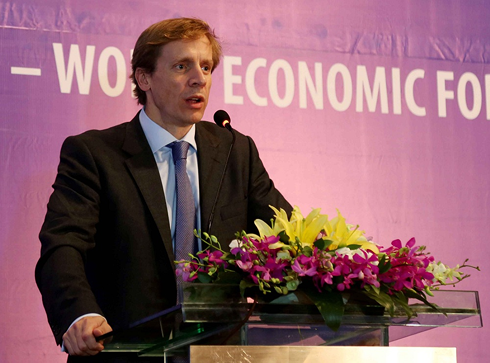(VOVWORLD) - The Vietnamese government is striving to make fundamental improvements in Vietnam’s business environment and economic competitiveness to obtain socio-economic development targets for 2018. The international community has acknowledged Vietnam’s efforts to reform and build long-term growth.
 Justin Wood, Head of Regional Agenda for Asia Pacific at the World Economic Forum Justin Wood, Head of Regional Agenda for Asia Pacific at the World Economic Forum |
The World Economic Forum (WEF) said Vietnam has progressed in technology and labor market efficiency. International experts say Vietnamese ministries and sectors have improved the business environment and competitiveness.
Positive feedback
The European Chamber of Commerce (EuroCham) acknowledged the Vietnamese government’s efforts to create visible changes in the business environment and Vietnam’s constructive and innovative approach to making enterprises partners in national trade, investment, and economic development. Local authorities have undertaken reform, creating opportunities for enterprises to join the market.
Ministries, like the Ministry of Planning and Investment and the Ministry of Industry and Trade have revised administrative procedures and removed business conditions in line with Vietnam’s Investment Law. Nicolas Audier, Co-Chairman of EuroCham Vietnam, said: “Vietnam’s investment environment, competitive production cost, strong economic prospect, young and well-educated workforce, and super location within the ASEAN make Vietnam a very attractive destination for foreign investors.”
Justin Wood, Head of Regional Agenda for Asia Pacific at the World Economic Forum, said that "if we look at the business environment in Vietnam, the country is making quite strong progress. If we look at the performance every year by indexes and WB business surveys measuring taxes and set up companies, Vietnam is really making progress on removing some of the obstacles that businesses face."
Challenges ahead
Although Vietnam’s competitiveness has improved, it needs to resolve pending issues to reach a higher position in the global value chain. Vietnam’s innovation index remains low. It covers investment on research and development and small number of innovation licenses.
Workforce quality and structure indexes reflect difficulties facing Vietnamese businesses such as staff recruitment and worker mobility. This limits the adaptability and growth of the economy.
Tomaso Andreatta, Co-Chairman of the Vietnam Business Forum, said: “The solution to this is to improve the knowledge and skills of workers. So they will become more productive, capable of using machines or automation in the era of Industry 4.0. It’s important for independent training companies to multiply and be allowed high freedom of curricula so they can quickly meet the changing needs of the market.”
The Vietnamese government deems it a regular task to improve the investment environment and competitiveness to obtain sustainable growth.